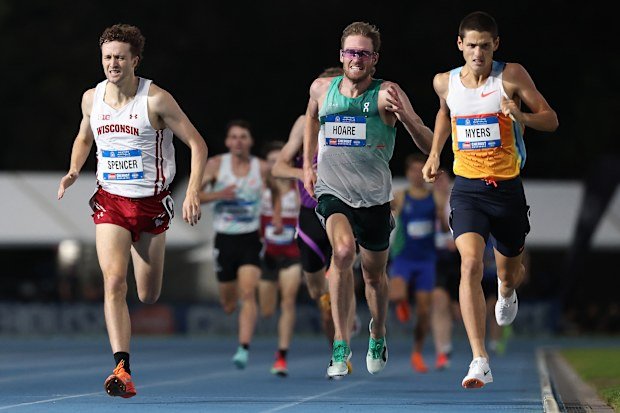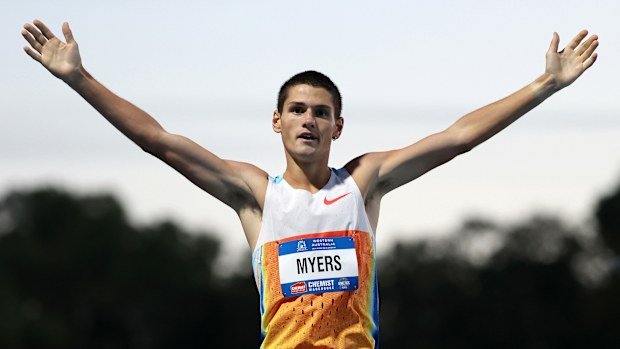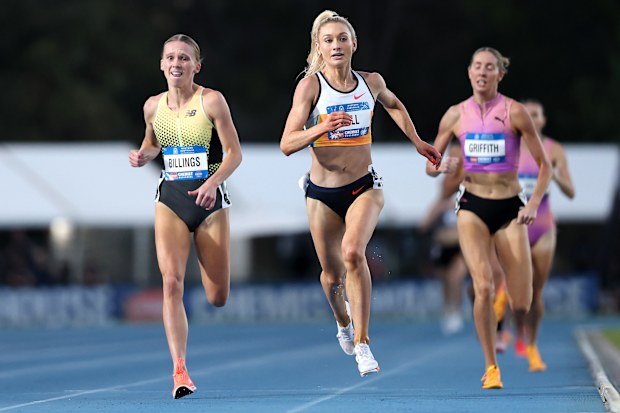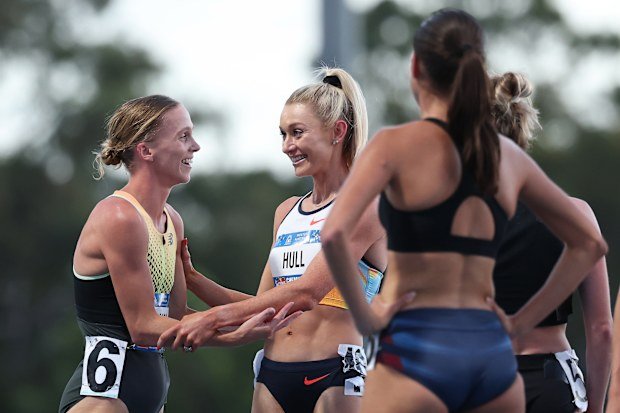Whether it was justified or not, Cameron Myers was not selected to compete at the Paris Olympics last year.
Fast forward to early this year, and at the age of just 18, he has emerged as Australia’s standout male middle-distance runner. This recognition was solidified with his triumph in the 1500 metres at the national championships held in Perth on Saturday evening.
With the Tokyo World Championships set for September, where the talented athlete from Canberra hopes to make his senior global debut, his selection now seems certain.
On a night when Jessica Hull clinched the women’s 1500-metre title—describing the race as “very strange”—Myers secured the men’s championship by taking the lead with 400 metres to go and maintaining it until the finish.
He crossed the line in 3:34.39, outpacing two of the three athletes selected for the Paris Games in the process: reigning national champion Adam Spencer and Commonwealth Games gold medallist Oliver Hoare.
Spencer claimed the silver with a time of 3:34.57 while Hoare took home the bronze in 3:34.61.

Adam Spencer (left), Oliver Hoare (centre), and Cameron Myers sprint down the home straight. Getty
Back in February, frustration within the Myers camp reached its peak when his manager, James Templeton, took aim at Australian Athletics (AA) selection chair Peter Hamilton following a dazzling performance by the young runner.
“He’s performing so well that even Peter Hamilton will have to select him this year,” Templeton remarked in an interview with Wide World of Sports.
Myers faced elimination for Olympic selection against Stewart McSweyn, who is absent from these national championships, as well as Spencer and Hoare.
After placing fifth in a lacklustre performance at last year’s national finals, his fastest qualifying time was still slower than those of the three athletes chosen for the Paris Games.
However, there is a belief among certain circles in Australian athletics that Myers, regarded as a serious contender for medals at the Los Angeles 2028 and Brisbane 2032 Olympics, should have been given the opportunity to compete in France.
Some also argue that selectors ought to have restricted McSweyn to competing only in the 5000 metres in Paris; instead, he’s been chosen for both events.

Cameron Myers celebrates his victory in the men’s 1500m final. Getty
Opinions vary, with some asserting that Olympic teams should not serve as “development” squads—countering the argument that advocates for the inclusion of promising talent.
Different narratives emerge from various factions.
Spencer, Hoare, and McSweyn were all eliminated in the repechage round in Paris.
For Myers, a silver lining exists in his disappointing finish at last year’s national finals and the subsequent Olympic exclusion, as it fuelled his determination this year.
“Last year, I was incredibly disappointed after those championships, and I believe it motivated me to push myself harder this year,” Myers stated to reporters at WA Athletics Stadium.
“Sometimes in this sport, setbacks can be crucial to igniting your passion and drive. That experience was pivotal for my growth as an athlete, and I aim to carry this momentum forward.”
“I’ve moved beyond my prior disappointments; I’m not dwelling on them as I did last year,” he added when asked if he still felt bitter about his non-selection.
“It’s more about how I can leverage that disappointment to grow as an athlete.”
“I feel confident that I’ll be selected for Tokyo [the World Championships in September], and from there, it’s about focusing on each race. Once in the final, I want to compete for a medal.”

From left: Sarah Billings, Jessica Hull, and Georgia Griffith in action. Getty
Myers acknowledged after his triumph on Saturday that he had felt intimidated when competing against Hoare and McSweyn—two highly accomplished athletes whom he looked up to during his youth.
“I think it’s about not having the fear of racing against them that I did last year,” he explained.
“Coming into last year’s championships, I was quite jittery because I was racing against people like Olli and Stewy. These are athletes I grew up watching and admired greatly.
“It’s a surreal experience to compete against those you idolise; it’s easy to think they’re superior to you.
“Now, I’m learning to respect myself as a competitor and understand that I can stand my ground against them.”
“Having confidence going into every race is essential if you want to win, and that’s something I was lacking before.”
The opening laps of Saturday night’s women’s 1500m final unfolded at a notably slow pace compared to the elite standard of the competitors.

Jessica Hull (right) and Sarah Billings embrace after a fierce competition. Getty
However, Hull surged into the lead with just over a lap to go and was sprinting hard as the bell rang.
Billings made a late charge on the home straight, nearly stealing the win, but Hull held firm to claim victory in 4:11.36.
Billings took silver in 4:11.51, with Georgia Griffith capturing bronze in 4:12.09.
“It was a very strange race,” Hull laughed.
“When you’re over 400 metres from the finish, everyone starts questioning their abilities. It’s a long haul to sprint that distance.
“I really wanted to make the others either commit or settle for second place, and as I approached the final straight, I heard my dad [her coach] urging me to use my gears, which motivated me to push again with 100 metres left. Keeping the pressure on when others are closing in can be quite disheartening for them.”
Compiled by SportArena.com.au.
Fanpage: SportArena.com.au.
LiveScore – Live Sports Results & Odds.




